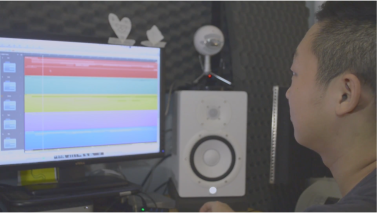Upon first meeting Paul Chang (CC ’19), one has simultaneously every idea and no idea what to expect. He is at once like the music he produces and loves–multifaceted, soothing, with an unfairly-natural sense of rhythm–yet also a whole artichoke’s worth of layers to boot, with his passions for cooking, psychology, and Daniel Caesar. Paul is, in some ways, a manifestation of a musical yin-yang, continuously exploring sound-worlds that mirror his own mindspace and spirituality, exploring the boundaries between composer, performer, and audience.
With the influence of his uncle as a professional music producer, Paul first dipped his toes into the world of producing at age eight, eschewing classical piano lessons (#same) in favor of guitar, banjo, the drums, and, yes, GarageBand. Paul’s kaleidoscopic approach to music is an organic, weaving foray into textures and harmonies, reflected in how he approaches the very act of production: a way of enabling connection with those one might not otherwise be able to connect with. Paul spoke of meeting a student in Hiroshima on a Christian fellowship, where there was little exchanged between them beyond, “let’s play some drums.” That “most beautiful ten minutes of my life,” replete with unspoken connection, encompasses Paul’s central belief of music as freedom, as improvisation, and “expressing your own voice.”

Paul’s producer’s ear often dictates what he parses through in a song or piece: a particularly mesmerizing downbeat here, a nuanced wash of color there. When Paul produces, he quite literally engineers a mood or vibe from an assembly line of moving parts, like he dissects then resurrects the fibers of sound itself. When “the smallest change can completely shift your experience of the music,” every note or turn of phrase Paul mixes is deliberate. Effects, compression, and saturation of sound are only a few parts to that equation–the rest encompasses a deeply personal relationship between Paul and his client. For Paul, the end song is only as cohesive as the entire workflow: start-to-finish, Paul sits down with his client and tunes their ears to the seemingly-endless combination of dials and effects on his screen. When “everything is so compartmentalized in the modern music world,” that continuous connection with another artist allows Paul to mix the best music he can.
Aside from music, Paul dabbles in psychology — “so applicable no matter what field you’re in, as long as you’re working with people” — Jacob Collier, and TV shows like K-Pop Star (you know, it’s casual). He loves experimenting with cooking, and unsurprisingly connects it to the mixing process: the smallest extra dash of salt could shift the whole dish’s tonal palette. Ethiopian food has been a favorite as of late, as has “Blessed,” Daniel Caesar’s euphoric pairing of washy organ with muffled vocals.
As far as advice for Columbia musicians and beyond? “Treat someone else’s success or mastery of their art as a source of inspiration rather than discouragement.” Again, one sees how Paul has so adeptly mastered the yin-yang within himself: finding ways to be complacent with his own ability, while also morphing it into motivation to continuously be better and do better. It’s a good reminder for those of us balking against the sheer power of Paul’s talent not to take ourselves too seriously–but, then again, not all of us can say we were almost broadcast on national Korean television.
get in touch with Paul: paulchangbooking@gmail.com
follow Paul on Facebook & Youtube
special thanks to Gelila Yitsege for contributing to this post!
twitter: @imma_gelila
instagram: @itsgelila
liked what you read? check out more beets & noodz interviews here
contributors: Jordan Lee, Cindy Liu, and Adrian Traviezo
learn more about us!


this is amazing!!! thank you for sharing, b&n ❤ also pls share ethiopian restaurant recs, asking for a friend
LikeLiked by 1 person
Thank you!! We went to Massawa near Columbia recently and it was a hit – highly recommend going in a group
LikeLike